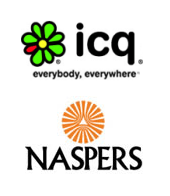 Last week, it was reported that AOL – amid restructuring efforts in the lead-up to the imminent Time Warner spin-off and IPO – was putting its instant messaging service unit ICQ on the block and had hired bankers Allen & Co. and Morgan Stanley to assist in the sales process.
Last week, it was reported that AOL – amid restructuring efforts in the lead-up to the imminent Time Warner spin-off and IPO – was putting its instant messaging service unit ICQ on the block and had hired bankers Allen & Co. and Morgan Stanley to assist in the sales process.
According to the reports, AOL was looking to offload the asset for $300 million and talking to a pair of non-US companies about an acquisition (likely in a part cash, part stock transaction).
Question is: who are those potential buyers?
We’ve pinned down one who, sources say, has already engaged in late-stage negotiations with AOL about a buy-out that would occur after its planned December 2009 IPO: meet Naspers, a massive multinational media conglomerate that you’ve possibly never heard of.
Naspers (aka MIH Group) is a nearly century-old media company headquartered in Cape Town, South Africa that is listed on the Johannesburg Stock Exchange and also boasts an ADR listing on the London Stock Exchange. The group’s principal operations are in Internet platforms, pay-television and print media.
So what would make this a sensible move for Naspers?
Naspers’ principal Internet operations are currently in South Africa and elsewhere in sub-Saharan Africa, China, Russia, Eastern Europe, India, Brazil and Thailand. To expand its global footprint, buying ICQ would make sense as it already has stakes in a good number of complementary companies that operate on an international level.
An acquisition of ICQ, which has somewhere in between 40 and 50 million active users around the world – mainly in Germany, Russia, Ukraine and Israel – and is ‘moderately profitable’, would be a good move for the publicly listed media company to make in order to increase its international user base and create synergies between some of its ventures.
As outlined by Quintura CEO Yakov Sadchikov in a blog post speculating about Naspers’ interest in ICQ:
– the group owns a 35% stake in Tencent Holdings Limited, the operator of the wildly popular Chinese instant messaging platform QQ
– it boasts a 43% stake in Mail.ru, leading provider of internet and communication services for Russian speakers all over the world
– it holds 38% of Nimbuzz, a Netherlands-based global provider of instant-messaging and VoIP solutions for mobiles
– it has a 25% stake in global mobile advertising network operator BuzzCity (based in Singapore)
– it fully owns 24.com, one of the largest Internet publishers (offering blogs, email, social network and many other services) in Africa
– it recently acquired a majority interest in Brazil’s mobile services provider Compera nTime
– Naspers owns 100% of Gadu-Gadu, the leading Internet communications provider in Poland with further operations in Romania, Bulgaria and the Ukraine
– it has a 30% stake in MXIT, a mobile instant messaging service for South-Africans
– it’s the owner of Sanook!, Thailand’s no. 1 Web portal
The MIH Group also operates or owns a stake in a number of e-commerce platforms and auction websites, including Ricardo (mostly targeting Western European countries), Poland’s Allegro and Brazilian price comparison service BuscaPé, as well as local social networking sites like India’s Ibibo.
In other words, the group has been consistently building up quite a portfolio of multinational Internet and mobile communication properties, and picking up ICQ would fit perfectly into that expansion strategy.
According to our sources, Naspers was approached by AOL about a potential sale proactively, but is not the only corporation who might end up as the new parent company of ICQ. We reached out for confirmation or more information, but AOL declined to comment saying it doesn’t respond to rumors or speculation as a policy, and the MIH Group has not gotten back to us at this point. AOL is said to also be eying a sale of other properties, including MapQuest and Bebo.
AOL acquired ICQ (well, its then parent company Mirabilis) for $287 million in cash back in June 1998, with another $120 million in earn-outs for its executive team. Most of its 100-or-so employees are still located in Israel, where the company was originally established.
Stay tuned for more.